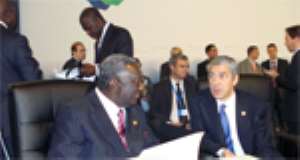
Ghana yesterday signed an interim Economic Partnership Agreement (EPA)-light with the European Commission.
The trade deal, which made the nation the second after Cote d'lvoire, would immediately eliminate tariffs on virtually all of Ghana's exports to Europe and on 80 per cent of imports from Europe over 15 years.
The move by Ghana and Cote d'lvoire, the world's top two cocoa exporters, was to avoid disruptions to its exports after preferential trade terms expires at the end of the year, Minister of Trade, Industry, Private Sector Development and President Special Initiative, Joe Baidoe-Ansah said.
The decision by government to sign the EPA means civil society groups were losing out on their campaign, though Nigeria and Cape Verde had signaled their intentions of not signing the agreement but rather opting for the Generalized Preference System (GSP+). With the GSP+, over 97 per cent of their exports would enter Europe duty-free.
Horticultural exporters in recent times had been urging government to sign the EPA-light in order to avert the possibility of losing out in business from January 1, 2008- a situation that compelled civil society groups and other trade sector bodies to push government to subscribe to the GSP+.
They contested that Ghana had met 25 out of the 27 criteria, making it eligible to subscribe to the GSP+.
Additionally, the procedures for the facility were not cumbersome as was being speculated, as through the GSP+, over 97 per cent of Ghana's exports would be covered.
But speaking to DAILY GUIDE on arrival from the EU-AU Lisbon summit also attended by President John Agyekum Kufuor and some ministers in Portugal, Mr. Baidoe-Ansah said in order not to disrupt trade between the two continents, there was the need to develop a new framework to guide trade into the future, hence the need to sign the EPA-light.
He however added that the deal should be a win-win situation for Africa and the European Union.
He said exporters from Ghana were facing very difficult times with the people they trade with in Europe and were not sure if they were going to do business with them from January 2008.
“We have not been able to negotiate a full EPA,” he said, explaining that Ghana as a country had reacted to some of the bottlenecks in the EPA, “but then we need a framework to ensure that trade is not distorted”.
According to him, without a framework, exports from Ghana to Europe would attract as much as 25 per cent tariff, which he described as not very good.
He said when this happens, local industries as well as businesses of exporters would collapse.
Earlier, Andrew Awuni, Press Secretary to the President, reacting to a question on Ghana's position on the EPA, mentioned that the EU had agreed to extend the time for the expiration of the Cotonou Agreement for continued negotiation “so we could come to some agreement”.
The EPA would replace the Cotonou Agreement signed in June 2000 between Europe and Africa, Caribbean and Pacific (ACP) countries.
The treaty was aimed at the reduction and eventual eradication of poverty while contributing to sustainable development and to the gradual integration of ACP countries into the world economy.
The EU had hoped to sign WTO-complaint Economic Partnership Agreements (EPAs) with six regional blocs, covering a host of other trade and investment issues, but negotiations with West Africa and other regions had missed the deadline.
Brussels is working on interim deals with countries likely to be worst affected by the expiry of the WTO waiver to ensure their export of goods could continue uninterrupted.
By Charles Nixon Yeboah & Emelia Ennin




 Tuesday’s downpour destroys ceiling of Circuit Court '8' in Accra
Tuesday’s downpour destroys ceiling of Circuit Court '8' in Accra
 SOEs shouldn't compromise on ethical standards, accountability – Akufo-Addo
SOEs shouldn't compromise on ethical standards, accountability – Akufo-Addo
 Father of 2-year-old boy attacked by dog appeals for financial support
Father of 2-year-old boy attacked by dog appeals for financial support
 Jubilee House National Security Operative allegedly swindles businessman over sa...
Jubilee House National Security Operative allegedly swindles businessman over sa...
 Nobody can order dumsor timetable except Energy Minister – Osafo-Maafo
Nobody can order dumsor timetable except Energy Minister – Osafo-Maafo
 Mahama wishes National Chief Imam as he clock 105 years today
Mahama wishes National Chief Imam as he clock 105 years today
 J.B.Danquah Adu’s murder trial: Case adjourned to April 29
J.B.Danquah Adu’s murder trial: Case adjourned to April 29
 High Court issues arrest warrant for former MASLOC Boss
High Court issues arrest warrant for former MASLOC Boss
 Align academic curriculum with industry needs — Stanbic Bank Ghana CEO advocates
Align academic curriculum with industry needs — Stanbic Bank Ghana CEO advocates
 Election 2024: We'll declare the results and let Ghanaians know we've won - Manh...
Election 2024: We'll declare the results and let Ghanaians know we've won - Manh...
